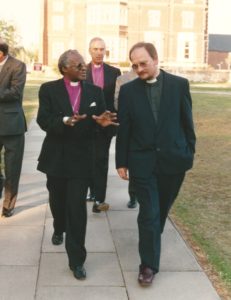Latest news
Press Release: Archbishop Desmond Tutu also a Champion for the Protection of Animals
27th December 2021

Archbishop Tutu and Andrew Linzey at the University of Essex in 1990
“It should not be forgotten that Archbishop Desmond Tutu was also a supporter of justice for animals,” says Professor Andrew Linzey, Director of the Oxford Centre for Animal Ethics.
In a forthright Foreword to the Global Guide to Animal Protection, Tutu wrote:
“I have spent my life fighting discrimination and injustice, whether the victims are blacks, women, or gays and lesbians. No human being should be the target of prejudice or the object of vilification or be denied his or her basic rights.
“But there are other issues of justice – not only for human beings but also for the world’s other sentient creatures. The matter of the abuse and cruelty we inflict on other animals has to fight for our attention in what sometimes seems an already overfull moral agenda. It is vital, however, that these instances of injustice not be overlooked.
“I have seen first-hand how injustice gets overlooked when the victims are powerless or vulnerable, when they have no one to speak up for them and no means of representing themselves to a higher authority. Animals are in precisely that position. Unless we are mindful of their interests and speak out loudly on their behalf, abuse and cruelty go unchallenged.
“It is a kind of theological folly to suppose that God has made the entire world just for human beings, or to suppose that God is interested in only one of the millions of species that inhabit God’s good earth.”
Tutu continued: “Our dominion over animals is not supposed to be despotism. We are made in the image of God, yes, but God – in whose image we are made – is holy, loving, and just. We do not honour God by abusing other sentient creatures.
If it is true that we are the most exalted species in creation, it is equally true that we can be the most debased and sinful. This realization should give us pause … There is something Christ-like about caring for suffering creatures, whether they are humans or animals.”
Archbishop Tutu concludes with his warm support for the Global Guide to Animal Protection and urges the reader to seek justice and protection for all creatures, humans and animals alike: “Churches should lead the way by making clear that all cruelty – to other animals as well as human beings – is an affront to civilized living and a sin before God.”
Desmond Tutu was archbishop emeritus of Cape Town and won the Nobel Peace Prize for his anti-apartheid work. Nelson Mandela described Tutu as: “sometimes strident, often tender, never afraid and seldom without humour, Desmond Tutu’s voice will always be the voice of the voiceless”.
“It was my privilege to meet Archbishop Tutu in 1990 when he gave the University Sermon at the University of Essex, where I was chaplain. It was clear then that he was the authentic moral voice of Anglicanism, and a hero in every sense of the word”, said Professor Linzey.
The Global Guide to Animal Protection is the result of collaboration between the Oxford Centre for Animal Ethics, a world-wide association of academics from all disciplines taking more than ten years to produce. It was published by the University of Illinois Press 2013.
Raising awareness of human indifference and cruelty toward animals, The Global Guide includes more than 180 introductory articles that survey the extent of worldwide human exploitation of animals from a variety of perspectives. In addition to entries on often disturbing examples of human cruelty toward animals, the book provides inspiring accounts of attempts by courageous individuals –including Jane Goodall, Shirley McGreal, Biruté Mary Galdikas, Bernard E. Rollin, and Roger Fouts – to challenge and change exploitative practices.
The Global Guide was edited by Professor Linzey, who is Director of the Oxford Centre for Animal Ethics and has been a member of the Faculty of Theology at Oxford University for twenty eight years. He has produced more than thirty books, including Animal Theology also published by the University of Illinois Press.